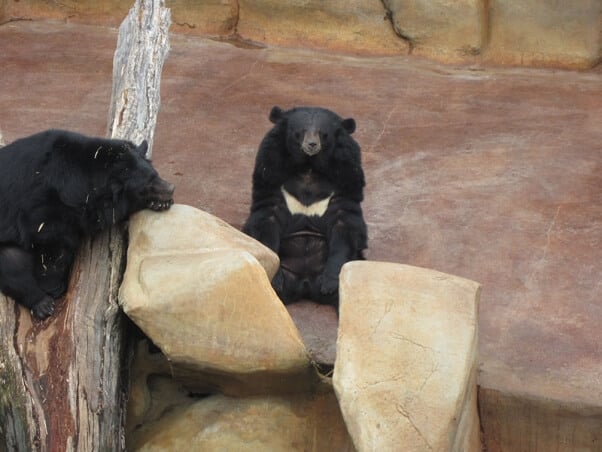Why Are These Bears Living in a Concrete Pit?
For years, bears at Three Bears General Store in Pigeon Forge, Tennessee, have been relegated to a barren concrete pit. During a recent inspection of the roadside zoo, a U.S. Department of Agriculture (USDA) inspector noted that an older Himalayan black bear named Honey had a large patch of thinning hair and that her eyes were “glazed” and she was having difficulty moving. The facility’s owner apparently hadn’t bothered to call a veterinarian to assess or treat her.
This is just the latest in a long list of Animal Welfare Act (AWA) violations at Three Bears that also includes keeping bears in filthy enclosures strewn with their own waste—which prompted PETA to renew our call for the facility to retire the bears to a reputable wildlife sanctuary where they’d be able to roam, dig, and simply be bears on acres of lush terrain, free from harassment by gawking tourists.

In other news:
- A recent photograph on a blog post shows that two visitors to the Cincinnati Zoo posed dangerously close to a captive elephant while a nearby zookeeper held a bullhook—a weapon that resembles a fireplace poker with a sharp metal hook on one end. The Association of Zoos and Aquariums (AZA) prohibits unprotected contact between elephants and the public and requires that its members maintain a safe barrier between zookeepers and elephants—a practice that should make cruel bullhooks obsolete. PETA fired off a letter to the AZA urging the organization to require that the Cincinnati Zoo end these dangerous photo opportunities or revoke its accreditation.
- The deplorable Dade City’s Wild Things roadside zoo in Dade City, Florida, got slapped with yet another set of citations from the USDA for, among other violations, denying adequate veterinary care to an opossum who was being “treated” for a tail injury with a medication that expired in 2012; failing to provide lions, tigers, and coyotes with adequate shelter from the elements; allowing enclosures and fencing to become filthy and fall into dangerous disrepair; and failing to provide llamas with clean, drinkable water. These citations come a little more than a month after the USDA filed a lawsuit against the Florida facility for allegedly exposing young tigers to systematic stress and abuse by routinely forcing them to “swim” and “play” with members of the public.
- Kliebert’s Turtle & Alligator Farm—which breeds and slaughters alligators for their meat and skins—had the audacity to apply for an Endangered Species Act (ESA) permit to breed eight species of reptiles, including crocodiles and caimans. We’ve submitted formal comments to the U.S. Fish and Wildlife Service opposing the application. The ESA requires permit applicants to demonstrate that their activities will enhance the survival of a species in the wild. Not only has Kliebert’s racked up 15 AWA violations in just over a year, it also lacks the expertise, staff, and facilities to manage and maintain a conservation breeding program. The facility’s intention appears to be to breed endangered reptiles for public display—like the alligators it currently uses for photo ops during which visitors straddle the restrained animals. A 5-year-old member of the Kliebert family has even been permitted to “wrestle” an alligator, an activity that defies the very word “conservation.”
- The latest inspection of The Farm at Walnut Creek—a notorious roadside zoo that PETA has tracked for years—resulted in a dozen more citations, most of which are repeat violations. The latest include continuing to castrate lambs and cut off their tails without veterinary guidance, allowing a suffering buffalo to languish for three months after a veterinarian recommended that he be euthanized, denying adequate veterinary care to multiple animals, and continuing to dose animals with chemicals to induce temporary paralysis for the sole purpose of restraining them when conducting routine procedures—without giving them any anesthetics. Despite many previous citations from the USDA, visitors are still allowed direct and unsupervised contact with the animals. PETA has filed a lawsuit against the USDA for automatically renewing the licenses of repeat violators. The Farm at Walnut Creek is one of five facilities named in the lawsuit.
Keep checking back. There’s a lot more in the works.
What You Can Do
Urge Three Bears General Store to retire all bears to a sanctuary.

